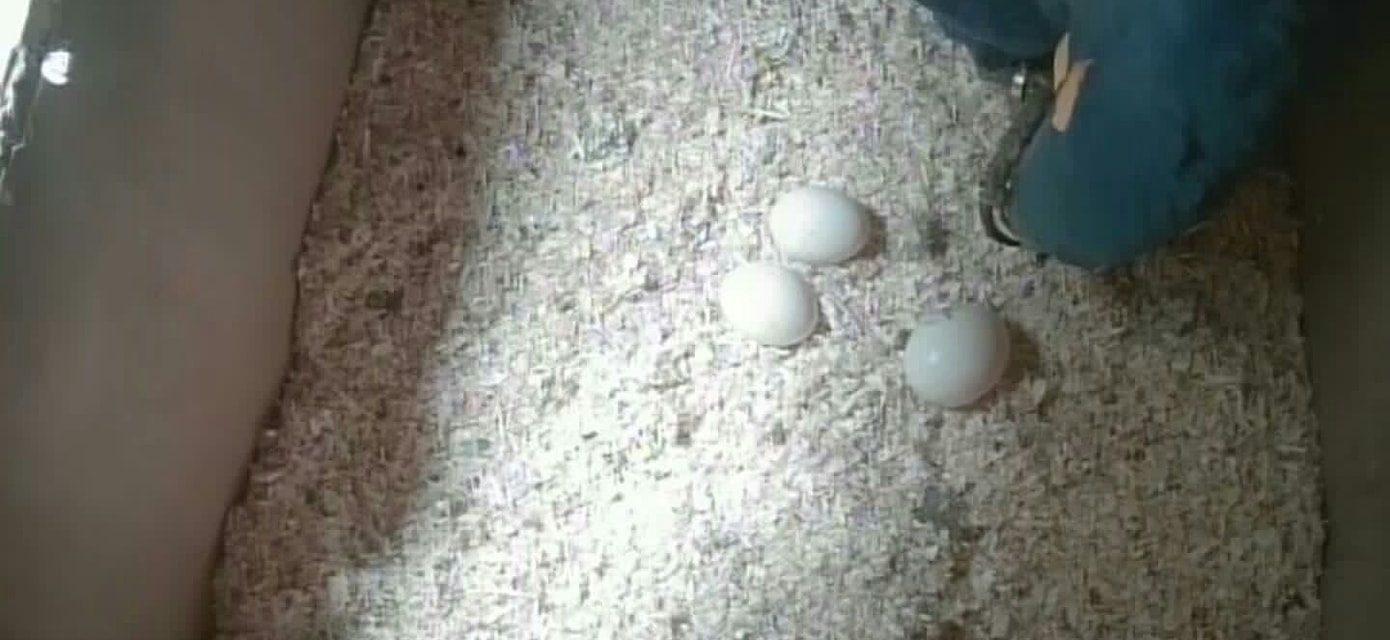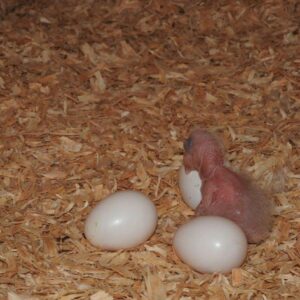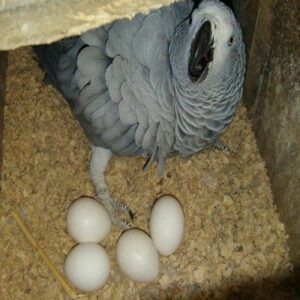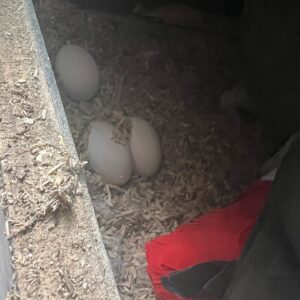Fertile Parrot Eggs and Healthy Parrot Chicks: A Complete Guide
Fruchtbare Gala-Kakadu-Eier zu verkaufen
Parrots are magnificent creatures, known for their bright feathers, playful personalities, and ability to mimic sounds. When it comes to breeding parrots, ensuring the fertility of parrot eggs and raising healthy chicks is essential. This article covers everything you need to know about fertile parrot eggs and how to nurture healthy parrot chicks.
What Are Fertile Parrot Eggs?
Fertile parrot eggs are eggs that have been fertilized by a male parrot. Without fertilization, the eggs are infertile and will not hatch into chicks. Fertilization occurs when the male and female parrot mate successfully. After mating, the female will lay eggs that have the potential to develop into chicks if the conditions are right.
Signs of a Fertile Parrot Egg
There are certain signs to look for when determining if a parrot egg is fertile. These include:
- Veins inside the egg: By candling the egg (shining a light through it), you may see veins, which indicate a developing embryo.
- Movement: Around the 10th day of incubation, you may notice movement inside the egg.
- Change in weight: Fertile eggs will slightly increase in weight during incubation as the embryo grows.
How to Ensure Parrot Eggs are Fertile
To increase the chances of having fertile eggs, proper breeding conditions are crucial. Follow these tips:
- Healthy parents: Ensure both the male and female parrot are healthy, as the health of the parents directly affects the fertility of the eggs.
- Proper diet: Provide a well-balanced diet rich in nutrients to boost fertility.
- Optimal breeding environment: Maintain a comfortable temperature, humidity, and nesting space for the parrots.
Caring for Fertile Parrot Eggs
Once you have fertile eggs, the care process is critical for the successful hatching of chicks. Here are some tips:
- Incubation temperature: Keep the eggs in an environment with a temperature between 99.5°F and 100°F (37.5°C and 37.8°C).
- Humidity: The ideal humidity level during incubation is 40-50%, which should be increased to 65-70% during the last few days before hatching.
- Egg rotation: If you are using an incubator, rotate the eggs several times a day to prevent the embryo from sticking to the eggshell.
Hatching Parrot Chicks: What to Expect
After about 24 to 30 days of incubation, the eggs should start hatching. Here’s what to expect during the hatching process:
- Pipping: This is the first sign of hatching. The chick will make a small hole in the eggshell using its beak.
- Zipping: After pipping, the chick will begin to rotate inside the egg and create a zip-like line around the eggshell.
- Hatching: The chick will finally break free from the eggshell. This process can take up to 24 hours, so it is important not to interfere.
Caring for Newly Hatched Parrot Chicks
Newly hatched chicks require specialized care to ensure they grow into healthy adult parrots. Here’s how to provide the best care:
- Warmth: Keep the chicks in a warm environment, preferably around 95°F (35°C) during the first week.
- Feeding: Hand-feed the chicks using a specialized hand-rearing formula. Feed them every 2-4 hours for the first few days.
- Hygiene: Keep the nesting area clean to prevent infections. Always wash your hands before handling the chicks.
Common Challenges When Breeding Parrots
Breeding parrots comes with its set of challenges. Here are a few common issues and how to address them:
- Infertile eggs: This may happen if the mating process wasn’t successful or if one of the parents has fertility issues. Ensure optimal breeding conditions and consult a vet if infertility persists.
- Egg binding: This is a condition where the female parrot has difficulty laying eggs. It can be life-threatening if not treated promptly. Make sure the female is on a nutritious diet and consult a vet if you notice signs of egg binding.
- Weak chicks: Some chicks may hatch weaker than others. Provide them with extra care, warmth, and nutrition to help them grow stronger.
Certainly! Let’s continue from where we left off:
Monitoring the Growth of Parrot Chicks
After the chicks hatch, they grow rapidly during the first few weeks. Monitoring their development is important to ensure they are growing at a healthy rate. Here’s what to look out for:
- Weight gain: A healthy chick will steadily gain weight. Use a small scale to track their daily weight, ensuring they are growing consistently.
- Feather development: In the first few weeks, chicks will develop downy feathers. Full feathering usually occurs around 8 to 10 weeks.
- Physical activity: Healthy chicks will become increasingly active as they grow. They will begin stretching their wings and practicing balancing on their feet as they get stronger.
Weaning Parrot Chicks
As the chicks grow, they will transition from hand-feeding to eating solid foods. This process is called weaning, and it typically begins when the chicks are around 6-8 weeks old.
- Introduce solid foods: Start by offering soft fruits, vegetables, and soaked seeds. Gradually introduce more variety as the chicks grow older.
- Reduce hand-feeding: As the chicks start eating more solid foods, gradually decrease the frequency of hand-feeding.
- Monitor independence: Chicks will naturally begin to eat more on their own as they grow. Once they are fully eating on their own, they are considered weaned.
Socializing Parrot Chicks
Proper socialization is key to ensuring that your parrot chicks grow into well-adjusted, friendly birds. Early socialization helps them become comfortable with human interaction and their surroundings.
- Handling the chicks: Gently handle the chicks daily to get them used to human touch. Be calm and patient to build trust.
- Expose them to different environments: Gradually introduce the chicks to new spaces and sounds to prevent fear and anxiety later in life.
- Positive reinforcement: Use gentle praise and rewards to encourage positive behavior. Avoid scolding, as this can create fear in the birds.
Health Checkups and Vet Visits
Regular health checkups are essential for keeping your parrot chicks healthy. Early detection of any health issues can prevent serious problems later on.
- Initial vet visit: Once the chicks are about 4-6 weeks old, take them to a vet for their first checkup. The vet will examine their overall health and offer guidance on diet and care.
- Vaccinations and deworming: Depending on the breed and region, your vet may recommend vaccinations or deworming to protect the chicks from common diseases and parasites.
- Signs of illness: Keep an eye out for any unusual behavior or symptoms, such as lethargy, loss of appetite, or respiratory issues. Early treatment is crucial for a quick recovery.
Final Thoughts
Raising parrot chicks is a delightful journey that requires dedication, knowledge, and attention to detail. From ensuring the fertility of the eggs to providing the proper care after hatching, each step is crucial to the health and well-being of your parrots. By following best practices for breeding, incubation, feeding, and socialization, you can help your parrot chicks grow into healthy, vibrant birds that thrive in their environment.
With the right care and attention, the next generation of parrots will not only bring joy to your life but also contribute to the preservation of these beautiful creatures




